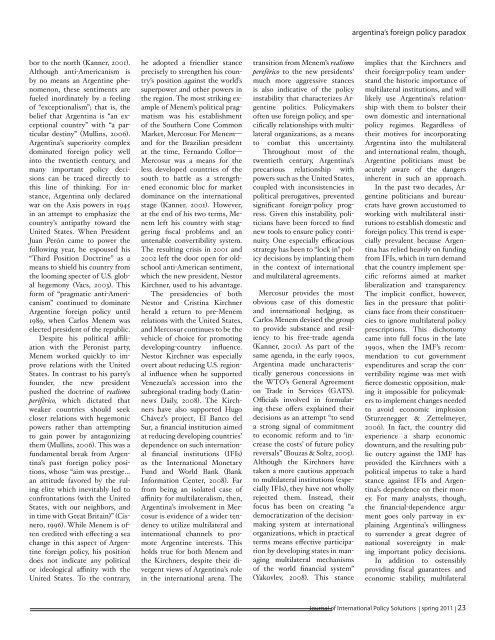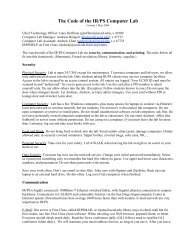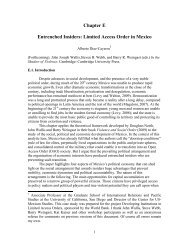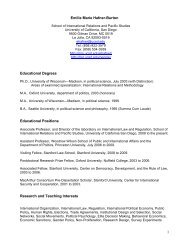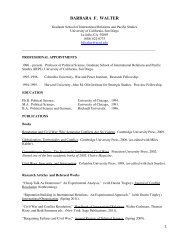to download the full journal. (1.2MB PDF) - School of International ...
to download the full journal. (1.2MB PDF) - School of International ...
to download the full journal. (1.2MB PDF) - School of International ...
Create successful ePaper yourself
Turn your PDF publications into a flip-book with our unique Google optimized e-Paper software.
argentina’s foreign policy paradox<br />
bor <strong>to</strong> <strong>the</strong> north (Kanner, 2001).<br />
Although anti-Americanism is<br />
by no means an Argentine phenomenon,<br />
<strong>the</strong>se sentiments are<br />
fueled inordinately by a feeling<br />
<strong>of</strong> “exceptionalism”; that is, <strong>the</strong><br />
belief that Argentina is “an exceptional<br />
country” with “a particular<br />
destiny” (Mullins, 2006).<br />
Argentina’s superiority complex<br />
dominated foreign policy well<br />
in<strong>to</strong> <strong>the</strong> twentieth century, and<br />
many important policy decisions<br />
can be traced directly <strong>to</strong><br />
this line <strong>of</strong> thinking. For instance,<br />
Argentina only declared<br />
war on <strong>the</strong> Axis powers in 1945<br />
in an attempt <strong>to</strong> emphasize <strong>the</strong><br />
country’s antipathy <strong>to</strong>ward <strong>the</strong><br />
United States. When President<br />
Juan Perón came <strong>to</strong> power <strong>the</strong><br />
following year, he espoused his<br />
“Third Position Doctrine” as a<br />
means <strong>to</strong> shield his country from<br />
<strong>the</strong> looming specter <strong>of</strong> U.S. global<br />
hegemony (Vacs, 2003). This<br />
form <strong>of</strong> “pragmatic anti-Americanism”<br />
continued <strong>to</strong> dominate<br />
Argentine foreign policy until<br />
1989, when Carlos Menem was<br />
elected president <strong>of</strong> <strong>the</strong> republic.<br />
Despite his political affiliation<br />
with <strong>the</strong> Peronist party,<br />
Menem worked quickly <strong>to</strong> improve<br />
relations with <strong>the</strong> United<br />
States. In contrast <strong>to</strong> his party’s<br />
founder, <strong>the</strong> new president<br />
pushed <strong>the</strong> doctrine <strong>of</strong> realismo<br />
periférico, which dictated that<br />
weaker countries should seek<br />
closer relations with hegemonic<br />
powers ra<strong>the</strong>r than attempting<br />
<strong>to</strong> gain power by antagonizing<br />
<strong>the</strong>m (Mullins, 2006). This was a<br />
fundamental break from Argentina’s<br />
past foreign policy positions,<br />
whose “aim was prestige…<br />
an attitude favored by <strong>the</strong> ruling<br />
elite which inevitably led <strong>to</strong><br />
confrontations (with <strong>the</strong> United<br />
States, with our neighbors, and<br />
in time with Great Britain)” (Cisnero,<br />
1996). While Menem is <strong>of</strong>ten<br />
credited with effecting a sea<br />
change in this aspect <strong>of</strong> Argentine<br />
foreign policy, his position<br />
does not indicate any political<br />
or ideological affinity with <strong>the</strong><br />
United States. To <strong>the</strong> contrary,<br />
he adopted a friendlier stance<br />
precisely <strong>to</strong> streng<strong>the</strong>n his country’s<br />
position against <strong>the</strong> world’s<br />
superpower and o<strong>the</strong>r powers in<br />
<strong>the</strong> region. The most striking example<br />
<strong>of</strong> Menem’s political pragmatism<br />
was his establishment<br />
<strong>of</strong> <strong>the</strong> Sou<strong>the</strong>rn Cone Common<br />
Market, Mercosur. For Menem—<br />
and for <strong>the</strong> Brazilian president<br />
at <strong>the</strong> time, Fernando Collor—<br />
Mercosur was a means for <strong>the</strong><br />
less developed countries <strong>of</strong> <strong>the</strong><br />
south <strong>to</strong> battle as a streng<strong>the</strong>ned<br />
economic bloc for market<br />
dominance on <strong>the</strong> international<br />
stage (Kanner, 2001). However,<br />
at <strong>the</strong> end <strong>of</strong> his two terms, Menem<br />
left his country with staggering<br />
fiscal problems and an<br />
untenable convertibility system.<br />
The resulting crisis in 2001 and<br />
2002 left <strong>the</strong> door open for oldschool<br />
anti-American sentiment,<br />
which <strong>the</strong> new president, Nes<strong>to</strong>r<br />
Kirchner, used <strong>to</strong> his advantage.<br />
The presidencies <strong>of</strong> both<br />
Nes<strong>to</strong>r and Cristina Kirchner<br />
herald a return <strong>to</strong> pre-Menem<br />
relations with <strong>the</strong> United States,<br />
and Mercosur continues <strong>to</strong> be <strong>the</strong><br />
vehicle <strong>of</strong> choice for promoting<br />
developing-country influence.<br />
Nes<strong>to</strong>r Kirchner was especially<br />
overt about reducing U.S. regional<br />
influence when he supported<br />
Venezuela’s accession in<strong>to</strong> <strong>the</strong><br />
subregional trading body (Latinnews<br />
Daily, 2008). The Kirchners<br />
have also supported Hugo<br />
Chávez’s project, El Banco del<br />
Sur, a financial institution aimed<br />
at reducing developing countries’<br />
dependence on such international<br />
financial institutions (IFIs)<br />
as <strong>the</strong> <strong>International</strong> Monetary<br />
Fund and World Bank (Bank<br />
Information Center, 2008). Far<br />
from being an isolated case <strong>of</strong><br />
affinity for multilateralism, <strong>the</strong>n,<br />
Argentina’s involvement in Mercosur<br />
is evidence <strong>of</strong> a wider tendency<br />
<strong>to</strong> utilize multilateral and<br />
international channels <strong>to</strong> promote<br />
Argentine interests. This<br />
holds true for both Menem and<br />
<strong>the</strong> Kirchners, despite <strong>the</strong>ir divergent<br />
views <strong>of</strong> Argentina’s role<br />
in <strong>the</strong> international arena. The<br />
transition from Menem’s realismo<br />
pereférico <strong>to</strong> <strong>the</strong> new presidents’<br />
much more aggressive stances<br />
is also indicative <strong>of</strong> <strong>the</strong> policy<br />
instability that characterizes Argentine<br />
politics. Policymakers<br />
<strong>of</strong>ten use foreign policy, and specifically<br />
relationships with multilateral<br />
organizations, as a means<br />
<strong>to</strong> combat this uncertainty.<br />
Throughout most <strong>of</strong> <strong>the</strong><br />
twentieth century, Argentina’s<br />
precarious relationship with<br />
powers such as <strong>the</strong> United States,<br />
coupled with inconsistencies in<br />
political prerogatives, prevented<br />
significant foreign-policy progress.<br />
Given this instability, politicians<br />
have been forced <strong>to</strong> find<br />
new <strong>to</strong>ols <strong>to</strong> ensure policy continuity.<br />
One especially efficacious<br />
strategy has been <strong>to</strong> “lock in” policy<br />
decisions by implanting <strong>the</strong>m<br />
in <strong>the</strong> context <strong>of</strong> international<br />
and multilateral agreements.<br />
Mercosur provides <strong>the</strong> most<br />
obvious case <strong>of</strong> this domestic<br />
and international hedging, as<br />
Carlos Menem devised <strong>the</strong> group<br />
<strong>to</strong> provide substance and resiliency<br />
<strong>to</strong> his free-trade agenda<br />
(Kanner, 2001). As part <strong>of</strong> <strong>the</strong><br />
same agenda, in <strong>the</strong> early 1990s,<br />
Argentina made uncharacteristically<br />
generous concessions in<br />
<strong>the</strong> WTO’s General Agreement<br />
on Trade in Services (GATS).<br />
Officials involved in formulating<br />
<strong>the</strong>se <strong>of</strong>fers explained <strong>the</strong>ir<br />
decisions as an attempt “<strong>to</strong> send<br />
a strong signal <strong>of</strong> commitment<br />
<strong>to</strong> economic reform and <strong>to</strong> ‘increase<br />
<strong>the</strong> costs’ <strong>of</strong> future policy<br />
reversals” (Bouzas & Soltz, 2005).<br />
Although <strong>the</strong> Kirchners have<br />
taken a more cautious approach<br />
<strong>to</strong> multilateral institutions (especially<br />
IFIs), <strong>the</strong>y have not wholly<br />
rejected <strong>the</strong>m. Instead, <strong>the</strong>ir<br />
focus has been on creating “a<br />
democratization <strong>of</strong> <strong>the</strong> decisionmaking<br />
system at international<br />
organizations, which in practical<br />
terms means effective participation<br />
by developing states in managing<br />
multilateral mechanisms<br />
<strong>of</strong> <strong>the</strong> world financial system”<br />
(Yakovlev, 2008). This stance<br />
implies that <strong>the</strong> Kirchners and<br />
<strong>the</strong>ir foreign-policy team understand<br />
<strong>the</strong> his<strong>to</strong>ric importance <strong>of</strong><br />
multilateral institutions, and will<br />
likely use Argentina’s relationship<br />
with <strong>the</strong>m <strong>to</strong> bolster <strong>the</strong>ir<br />
own domestic and international<br />
policy regimes. Regardless <strong>of</strong><br />
<strong>the</strong>ir motives for incorporating<br />
Argentina in<strong>to</strong> <strong>the</strong> multilateral<br />
and international realm, though,<br />
Argentine politicians must be<br />
acutely aware <strong>of</strong> <strong>the</strong> dangers<br />
inherent in such an approach.<br />
In <strong>the</strong> past two decades, Argentine<br />
politicians and bureaucrats<br />
have grown accus<strong>to</strong>med <strong>to</strong><br />
working with multilateral institutions<br />
<strong>to</strong> establish domestic and<br />
foreign policy. This trend is especially<br />
prevalent because Argentina<br />
has relied heavily on funding<br />
from IFIs, which in turn demand<br />
that <strong>the</strong> country implement specific<br />
reforms aimed at market<br />
liberalization and transparency.<br />
The implicit conflict, however,<br />
lies in <strong>the</strong> pressure that politicians<br />
face from <strong>the</strong>ir constituencies<br />
<strong>to</strong> ignore multilateral policy<br />
prescriptions. This dicho<strong>to</strong>my<br />
came in<strong>to</strong> <strong>full</strong> focus in <strong>the</strong> late<br />
1990s, when <strong>the</strong> IMF’s recommendation<br />
<strong>to</strong> cut government<br />
expenditures and scrap <strong>the</strong> convertibility<br />
regime was met with<br />
fierce domestic opposition, making<br />
it impossible for policymakers<br />
<strong>to</strong> implement changes needed<br />
<strong>to</strong> avoid economic implosion<br />
(Sturzenegger & Zettelmeyer,<br />
2006). In fact, <strong>the</strong> country did<br />
experience a sharp economic<br />
downturn, and <strong>the</strong> resulting public<br />
outcry against <strong>the</strong> IMF has<br />
provided <strong>the</strong> Kirchners with a<br />
political impetus <strong>to</strong> take a hard<br />
stance against IFIs and Argentina’s<br />
dependence on <strong>the</strong>ir money.<br />
For many analysts, though,<br />
<strong>the</strong> financial-dependence argument<br />
goes only partway in explaining<br />
Argentina’s willingness<br />
<strong>to</strong> surrender a great degree <strong>of</strong><br />
national sovereignty in making<br />
important policy decisions.<br />
In addition <strong>to</strong> ostensibly<br />
providing fiscal guarantees and<br />
economic stability, multilateral<br />
Journal <strong>of</strong> <strong>International</strong> Policy Solutions | spring 2011 | 23


